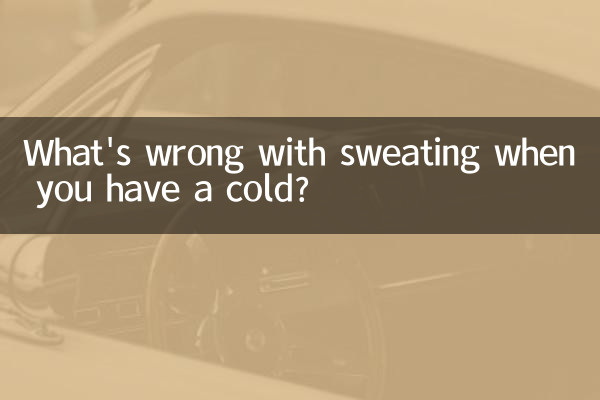What's wrong with sweating when you have a cold?
Colds are common diseases in daily life, and sweating during colds is a phenomenon that many patients will experience. So, what exactly is going on when you have a cold and sweat? This article will provide you with a detailed analysis of the causes, mechanisms, and countermeasures, combined with the hot topics and hot content on the Internet in the past 10 days, to provide you with a comprehensive answer.
1. Causes of cold and sweating

Sweating during a cold is usually related to the following factors:
| reason | illustrate |
|---|---|
| immune system response | When you have a cold, your body activates your immune system to fight viruses or bacteria, causing your body temperature to rise (fever), which is then dissipated through sweating. |
| drug effects | When you take a fever-reducing medicine (such as ibuprofen, acetaminophen), the medicine lowers your body temperature by dilating blood vessels and promoting sweat production. |
| weak body | During a cold, the body consumes a lot of energy and accelerates metabolism, which may lead to increased sweating. |
2. The mechanism of cold sweating
Sweating is one of the important ways the human body regulates body temperature. When you have a cold, the following mechanisms may cause sweating:
| mechanism | Detailed explanation |
|---|---|
| Thermoregulatory center activation | The thermoregulatory center in the hypothalamus raises the body temperature set point during an infection, causing fever; when the body temperature exceeds the set point, the body dissipates heat through sweating. |
| Sympathetic nervous excitement | When you have a cold, sympathetic nerve activity increases, which may stimulate sweat glands to secrete sweat. |
| release of inflammatory mediators | Viral or bacterial infections release inflammatory mediators such as prostaglandins, which may directly or indirectly affect sweat gland function. |
3. How to deal with colds and sweating
While sweating is a normal response of the body, excessive sweating can lead to dehydration or discomfort. Here are some suggestions for how to cope:
| method | specific measures |
|---|---|
| hydration | Drink plenty of warm water, light salt water or oral rehydration salts to avoid dehydration. |
| keep clean | Dry sweat promptly, change clothes, and avoid catching cold. |
| Rational use of medication | Avoid excessive use of antipyretics and follow medical advice. |
| Pay attention to rest | Reduce physical activity and ensure adequate sleep. |
4. Hot topics and cold-related discussions on the Internet in the past 10 days
Combined with recent Internet hot topics, the following are frequently asked questions and discussions about cold and sweating:
| hot topics | focus of discussion |
|---|---|
| “Is sweating when you have a cold detoxifying?” | Experts clarify: Sweating is body temperature regulation and has nothing to do with detoxification. |
| “What should I do if I sweat a lot after catching a cold?” | Netizens share their experience: Supplementing electrolytes is the key. |
| "Can I take a shower if I have a cold and sweat?" | Doctors recommend: A short shower with warm water can help cleanse, but avoid getting cold. |
5. Things to note and misunderstandings
Regarding cold sweating, there are some common misunderstandings that need to be paid attention to:
| Misunderstanding | scientific explanation |
|---|---|
| "Covering sweat can cure colds" | Excessive sweating may lead to hyperthermia or dehydration, which may worsen the condition. |
| “The more you sweat, the faster you get better.” | The amount of sweating is not directly related to the speed of recovery. You need to pay attention to the overall symptoms. |
Summarize
Sweating during a cold is a normal physiological response of the body to fight infection and is usually nothing to worry about. However, if it is accompanied by persistent high fever, confusion, or other serious symptoms, you should seek medical treatment promptly. With scientific care, rational use of medication, and adequate rest, most cold symptoms will gradually ease. I hope this article can help you better understand the mechanism of cold sweating and take the correct measures to deal with it.

check the details

check the details